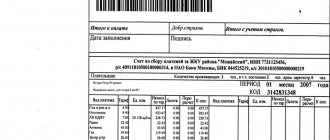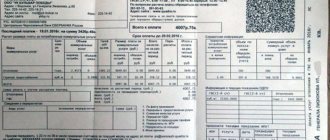Weaning technology
From management companies and homeowners associations, utility monopolists withdraw for their benefit a significant portion of the funds intended for the maintenance and repair of common property in a residential building. How?
The management company or homeowners association are, by law and under the energy supply agreement, the provider of utility services. This means that within a certain period of time, the partnership or management company is obliged to transfer to the monopolists’ account the amount for the entire house in full, regardless of how many residents have paid on that date. Suppose the debt is 10%, and then the management company, to pay the bill, is forced to take the missing amount from the money that residents paid directly to it for maintenance and repairs. And the company simply won’t have enough money to complete the required amount of work in the house. And so from month to month...
The mechanism for taking money using court decisions has been worked out perfectly by utility monopolists. Arbitration courts produce such decisions as if on an assembly line. And everything is according to the law. The only strange thing is that legislators do not see this as a problem, do not amend the laws, but enthusiastically make proposals that increase the imbalance of rights in favor of utility monopolists.
The good goal of reducing consumer costs for utility bills with the help of metering devices is now completely devalued by legislative practice, “tailored” to prevent a decrease in the income of utility monopolies and at the same time increase the costs of citizens when paying for services.
Proof of this is the annual increase in tariffs on products and products disproportionate to inflation. The state increases tariffs to please utilities and other monopolists not by the amount of inflation (8–10%), but by at least 15–20%.
How to find out the housing and communal services debt for the year? Checking your debts by payer code
If payment of housing and communal services is overdue for more than one month, in accordance with Article 155 of the Housing Code, penalties will be charged on the amount of the debt . Moreover, as the number of months of non-payment increases, the percentage of the fine will also increase:
Ways to check debts for housing and communal services
- A personal visit to the Criminal Code or the Dispatch Office is the most common and reliable way.
- When you contact the MFC, you can issue debt receipts.
- You can find out the total amount of debt at an ATM or terminal.
- Using Internet banking. Many large banks offer payment for housing and communal services on their official websites. In the same section you can find out the debt for housing and communal services.
- Using Internet services and electronic payment systems.
We recommend reading: How to refuse an antenna in an apartment in Moscow through the MFC.
Through Moscow banks, you can check the debt to housing and communal services at the place where utility bills are accepted. In addition, ATMs and terminals are programmed to issue a check against a personal account with data on the amount and timing of transfer of payments for the apartment.
All telephone numbers that provide information about the status of personal accounts are indicated on paper receipts. Additionally, this data can be obtained at the reception of the management company, housing and communal services, HOA, as well as at information stands located in the house.
Checking debts for housing and communal services through Moscow banks
After selecting the region and place of residence, the page will display a list of resource supply organizations. In addition, you will need to specify the calculation method. This can be done using an identification code or from the state information system.
The collected documents should be sent by registered mail, accompanied by a notification and a list of enclosed documents. After that, wait for a response. If this action does not bring any positive results, go to court with the same package of documents.
The easiest way to find out the utility debt by name is to contact the post office, where employees will provide the necessary information. Or use payment terminals.
Non-existent rent debt accrued: what to do
- Contact your home maintenance company. This can be done over the phone or in person. To obtain up-to-date information on the amount of debt for utility services, it is enough to indicate the address of the apartment.
- In financial institutions that accept payments from clients for housing and communal services. To find out information about the debt, you can specify both the address and the personal account.
- Using the services of Internet portals, having previously completed the mandatory registration procedure. Using official websites, you can receive information about accounts and debts at any time of the day. But do not forget about Internet security so that your personal data does not fall into the hands of scammers. To do this, you should use only official portals, such as the government services website.
At the cash desk of any bank it is possible to get an answer to your pressing question in the area of paying for utilities. Of course, you can traditionally go to the nearest housing and communal services department, which already stores the payer’s personal account. Some representatives of the older generation are accustomed to finding out the amounts for utilities at the post office. Today, you can use this method quite freely, risking spending a significant part of your time at the end of the month waiting for your turn.
And the counter doesn't help
Our utility costs, despite the use of metering devices, are growing, and the costs of maintaining a residential building and its repair are decreasing. Most management organizations apply prices set by the city government for the population. This is the main condition for the allocation of budget subsidies. It is for this reason that few people have the desire to set the price higher, although according to the Housing Code it can be individual for each house, depending on its technical condition and the whims of the residents.
The city rate of planned and normative expenses for the maintenance and repair of common property remained at the 2010 level, and the tariffs of utility monopolies increased by an average of 15%. This means that in 2011 Muscovites must pay tribute to utility monopolies 30% more than in 2010. Thus, the situation with underfunding of housing maintenance has worsened.
Tariffs are set for the utility company as a supplier of last resort by the regional energy commission and the Moscow government. For the population, it is the same, regardless of how the house is managed and includes the average costs of a utility company for the acquisition of resources, production, transmission of energy and energy carriers and the provision of public services, including costs associated with the production and provision of public services. The tariff includes the rate of return (or planned profitability of production) of the energy supply company.
For example, the heat produced by MOEK OJSC is 30% more expensive at cost than the heat produced by MOSENERGO OJSC. But in the sales structure of MOEK, 65% is cheap heat purchased from MOSENERGO and no more than 35% is expensive, our own. As a result, the tariff for the population turns out to be 7–8% lower than the tariff for other heat consumers.
Thus, it is quite correct to say that the population purchases utilities at a minimum at cost and, at a maximum, much more expensive. And talking about charity towards residents on the part of this organization is, to say the least, frivolous.
How to find out the debt for payment of housing and communal services
The easiest way to clarify the debt is to use the management company’s website. The user needs to log in and create his own personal account, which will help monitor accruals twenty-four hours a day. Penalties in case of late payment will also be displayed here. When registering, the apartment address and account number are indicated. Based on the recorded data, the system will be able to identify all charges for a specific area of housing and communal services.
We recommend reading: What is the difference between re-issuing a URN certificate and receiving a duplicate?
Find out how to pay housing and communal services via the Internet
Using the calculator, exact numbers are determined based on the calculation method and tariff rate. In the personal account, the user clearly monitors all changes, and also independently records the readings of all accounting equipment from the apartment.
How to find out debts for housing and communal services? There are a large number of ways to look at housing and communal services debt. You can do this remotely, without leaving your home, or you can go to organizations that have such information.
See the benefit
Don’t you find it strange that all conversations and discussions in the housing sector come down to what is better: an HOA or a commercial management company? Who should manage: professionals or cooks?
Of course, they are professionals, theorists and deputies, engaged by business and utility monopolies, convince us. And so, word by word, HOAs are already moving into the background.
Meanwhile, the third method of management – direct – is being implemented quite successfully in Russian cities. And I don’t remember any information about scandals, high-profile criminal cases related to the fleecing of residents in these cities.
So, what benefits does the direct method provide when paying for utilities?
Owners and tenants in “direct” houses, as consumers, enter into contracts for the provision of utility services directly with utility companies or with agents authorized by them (intermediaries who assume the status of providers of utility services). In both the first and second cases, the subscribers of the utility company are residents. This is a very important circumstance.
No matter how many intermediaries there are between the consumer and the utility, you are a subscriber of the utility, not a subscriber of the intermediary. There are no additional fees, because the tariff for the population takes into account all expenses and all losses of the utility company, including losses on the way to the apartment and the agent’s fee for mediation. The risk of non-payment by consumers is borne by the utility company. You are not responsible for your neighbors' non-payments. Everyone pays only for themselves.
To work with direct consumers - subscribers of a utility company, the service provider, represented by the company itself or its agent, is required by law to enter into an agreement with each subscriber and use meter readings for mutual settlements.
Accounting and distribution of general household expenses with the direct management method are the subject of an agreement concluded by each individual subscriber with the utility company. Let's consider the schemes that can be used in calculations.
For example, a house has a common metering device (BMU), while individual metering devices (IMU) are available in some apartments. A consumer who has an IPU pays for utilities in two parts: according to the readings of his meter and the share of expenses for general needs for appliances installed in public areas. It can be determined by the proportion of the total area of the consumer's apartment in relation to the total area of the house.
Residents of apartments that are not equipped with an IPU pay for services according to the general meter data minus the amount of apartment readings. The share of expenses can be determined by the number of registered or actual residents living in the apartment. The second part of the payment for general household expenses is determined in the same way as for those with private pension funds. Consumers do not bear any additional costs.
House-wide networks, through which services are provided, are leased to a utility company. Funds from rent, by decision of the general meeting of premises owners, are allocated for the maintenance of common property, its repair and other purposes.
Direct payment for housing and communal services: will the new system help you save money?
The law, signed by Vladimir Putin on April 3, allows consumers to pay for housing and communal services without intermediaries. The text of the document states: both the organizations supplying resources and the residents themselves have the right to sever relations with the management company.
From now on, residents of apartment buildings, by decision of the general meeting, can switch to direct contracts with resource supply organizations (RSO), which, according to the authors of the innovation, will lead to a reduction in unreasonably high tariffs and greater collection of utility bills.
However, independent experts have serious doubts about this. According to their estimates, the law is intended primarily to regulate tense relations between legal entities: the management company and the RSO, since the former owe about 250 billion rubles to resource officers.
Wasted on soap
Excluding unscrupulous management companies from the proven payment scheme for housing and communal services will provide an opportunity to save money, the head of state said in mid-December 2020 during his annual press conference. According to Vladimir Putin, many management companies are playing dishonestly. “Management companies first collect money for everything, and then pay, including with resource organizations,” he noted. “And they don’t always pay on time and in full, and few people keep an eye on this.”
Putin’s indignation, as usual, immediately made all the cogs of the country’s bureaucratic mechanism turn. Russian Minister of Construction and Housing and Communal Services Mikhail Men said that removing management companies from collecting payments for utility services will improve their quality. And already on March 23, 2018, the corresponding bill was adopted in final reading by the State Duma, and five days later it was approved by the Federation Council.
Citizens were given the right at a general meeting of homeowners to decide on concluding an agreement directly with the RSO. At the same time, the resource supplying organizations themselves can also refuse the contract for the supply of utilities through management companies and switch to direct contracts with consumers.
Resource providers can terminate relations with management companies subject to accumulated payment arrears. Experts emphasize that there are plenty of cases where management companies took money for utilities from residents, but did not redirect them to the accounts of resource-supplying organizations.
“In 2020, the debt of Russians for housing and communal services amounted to about 135 billion rubles, in 2016 already over 250 billion rubles and more than 600 billion rubles last year,” Anton Bykov, chief expert of the Center for Analytics and Financial Technologies, told MK . According to experts, 250 billion rubles of debt was formed through the fault of managers,” our interlocutor emphasized.
However, even if the management company is cut off from the cash flow, the tariffs will not decrease. Resource providers will have to expand their staff, on whose shoulders new functions will fall, for example, collecting debt from defaulters, says Evgeniy Bogomolny, head of the department at the Institute of Industry Management (IOM) of RANEPA. Resource suppliers will have to raise tariffs to cover these costs.
If we talk about the management companies themselves, their worries will not decrease. Their main responsibilities are the maintenance of the housing stock, its safe condition, and the creation of normal living conditions for apartment owners. “The jurisdiction of these organizations includes all communications, their maintenance, as well as the maintenance of the local area and cleaning of common areas,” Bogomolny concluded.
So that the house does not turn into a barracks
And there are plenty of problems in the relationship between owners and management companies. “In the ranking of complaints in the housing and communal services sector, the first place is occupied by citizens’ appeals regarding payments, the second place is taken by complaints against management companies: about 17% of the total number of complaints in Russia for the year,” noted the first deputy chairman of the Commission of the Public Chamber of the Russian Federation on housing and communal services, construction and roads Svetlana Razvorotneva in conversation with MK.
Conflicts arise due to the fact that management companies, as commercial organizations, want to get the maximum profit from their activities and do everything possible to achieve this - they save on performing their direct duties or inflate utility tariffs, Deputy Director of the Analytical Department of Alpari Natalya Milchakova. — Where it is possible to find a compromise between these conflicting interests, there are no conflicts. And where it is impossible - mainly due to the inflexibility, unprofessionalism and greed of the management company - a conflict arises."
For example, at the beginning of this year there was a loud conflict in Moscow due to the fact that the management company abnormally increased tariffs, and when the residents were unable to cover the bills, it stopped performing its functions. The owners spent a whole month without hot water, garbage collection or working elevators. As a result, one unscrupulous management company was replaced by another.
In Volgograd, another conflict between residents and the management company is currently flaring up. According to the reasonable opinion of the owners, the management company completely ignores fire safety requirements - and living in their house becomes risky. The roof of the building is leaking and water is flowing onto electrical panels and wiring. This story is especially relevant in light of the recent tragedy in the Kemerovo shopping center "Winter Cherry", where the managers were also negligent in fire safety. But the Volgograd conflict has not yet been resolved; the residents only wrote to the housing inspectorate and demanded an inspection by the Criminal Code.
The law will help “lawyers”, not “physicists”
MK's interlocutors are convinced that the transition to direct contracts will not help residents save money. It turns out that the only change for homeowners will be that utility bills will now be issued not by the management company, but by the corresponding RSOs. Tariffs will not rise or fall from the very adoption of such a law and from changes in the Housing Code. “After the law comes into force, amendments to the Housing Code must be legislatively approved, and then, when they are adopted, the residents of apartment buildings themselves at general meetings will decide whether to use this right or not,” noted Natalya Milchakova. — The law only gives residents the right to pay directly to RSO. This is not a requirement. The decision is made at a general house meeting.”
Resource providers, in turn, have the right to refuse direct contracts and continue to work with the management company as before. “In general, the services of a management company should be refused only when the management company does not fulfill its functions or inflates housing and communal services tariffs, provided that residents can prove this,” the expert emphasized. “And if the owners are satisfied with the work of the management companies, then there is no point in switching to a new payment system.”
There are two ways to refuse the services of management companies. Firstly, on the initiative of the resource officer, if there is a debt in the amount of more than two average monthly volumes from the management companies to the RSO, proven by the court. Another option: the decision of the general house meeting. But residents find it difficult to engage in such a discussion. People are often dissatisfied with their utilities, but when it comes time to make some kind of organizational effort, they don’t have time to do it.
“I don’t think that with the adoption of the law we should expect a massive transition to direct contracts with resource providers. For the most part, those who wanted to abandon the intermediary in the form of a management company have already done so, and now such relations will be legalized,” says Svetlana Razvorotneva.
According to her, the law has more to do with settlements between legal entities: “managers” and resource officers. “The management companies collected money from residents, but did not transfer it to resource supply organizations. The owners are dissatisfied with the management company not because they delay money transfers, but because it does not look after their home well and provides poor-quality services, continues Razvorotneva. — In this case, completely abandoning the Criminal Code will not help. It should be changed. It happens that for the debts of the management company, resource officers turn off the water in the apartments of the owners or the sewerage and electricity to the entire house. But all these actions are illegal.”
Ultimately, the adopted law will allow regulating the relations of conflicting legal entities: the management company and the RSO. As for homeowners in apartment buildings, they should not hope for a reduction in the tariff burden.
REFERENCE "MK": regions with the largest debt of the population to pay for housing and communal services, 2020.
Subject %
Dagestan - 30%
Ingushetia - 30%
Kabardino-Balkaria - 28%
North Ossetia - 27%
Chechnya - 20%
Questions regarding the application of the new law
The advantages of concluding direct contracts are obvious:
- exclusion of the intermediary from the relationship and savings on his services;
- payments for consumed resources directly from RSO.
At the same time, it is not yet clear how the law on direct payments in housing and communal services will be applied in practice without a management company as the accumulator of all payments. Thus, experts express doubts about how owners will protect their rights, having neither experience of such representation nor access to networks. Responsibility for the maintenance of intra-house networks still lies with the management company, but how they will participate in the relationship between the owners and the RSO, without being a party to the agreement, is not clear. The average citizen does not have the resources to determine the source of the problem, and participants in the housing and communal services system tend to shift responsibility to each other.
Basic provisions of the law
The system of direct contracts is considered more effective than the one currently existing in most regions of the Russian Federation. And it is already being successfully applied in practice, and not only in the capital. Direct settlements with resource supply organizations were introduced in St. Petersburg in 2018. For several years now, similar schemes have been used in the Irkutsk region, Leningrad region, Barnaul, etc.
In essence, the law on direct contracts with resource suppliers introduces a new system of relationships between homeowners and RSOs. Owners will have the right to enter into contracts directly with resource supply organizations, bypassing intermediaries. These intermediaries are now not only management companies, but also owners’ associations, housing or consumer cooperatives. Currently, it is these organizations that represent the interests of the owners of residential properties in payment for consumed electricity, hot and cold water, gas, etc.
Of course, the main objective of the law is to establish direct payments for services rendered, and this is done not only because of the dishonesty of some management companies. The law on direct payments in housing and communal services in 2018 will make it possible to remove from the management companies the unusual functions of collecting and distributing funds. Moreover, now citizens present demands to the management company for the quality of services, and to the RSO for payment for consumed resources. Meanwhile, management companies are responsible only for intra-house networks, and not for the supply of resources, and are sometimes forced to cover the debts of end consumers for resources from funds not intended for these purposes.
The new federal law introduces a scheme for direct settlements between consumers and RSOs, which will avoid the formation of new debts of management companies, but they are already threatening bankruptcies of both the RSOs and the management companies themselves.
The advantages of switching to such a relationship
- Management companies will not have anything to do with the population’s payments for housing and communal services , and they will no longer have the opportunity to direct this money to their own needs, instead of paying for utilities (there is no need to remind about the high-profile scandals regarding the waste or misuse of public money received by housing organizations from the population for housing and communal services)
- The amount of revenue of the management company will decrease due to the exclusion of payments from the population for utility services. As a result, many of them will be able to apply a simplified taxation system. As a result, payments to the budget and various funds will decrease, housing organizations will have more financial resources to carry out their immediate responsibilities.
- The benefit of resource supplying organizations will be that if they work with consumers correctly, the collection of payments for utility services will increase. As practice shows, from the population, with constant methodical collection of late payments, it is approximately 90%, while the same figure in relations with the management company is approximately 75%.
- Each consumer pays only for the volume of services that he received directly , and not together with his neighbor.
- Reducing cases of bankruptcy of management companies . After all, the money they collected from the population for housing and communal services often did not reach the RSO. The result was a lawsuit and the ruin of many management companies.
- The result of the transition to direct contracts will be an improvement in the quality of provided public services . RSOs, being large firms, have more opportunities than management companies to develop the process of providing housing and communal services. And by receiving payments from the population into their accounts, they also have such an obligation.










